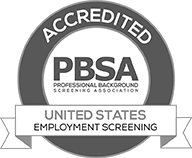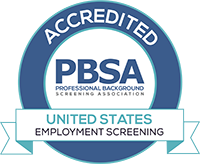BLOG
When Can An Adverse Action Occur?
October 17, 2023
Timing For Background Checks
The Second Chance Movement is a nationwide effort to help people with minor convictions find employment and other necessities. Numerous states, counties and cities have passed laws to help former inmates rejoin society. One thing many of these laws do is prohibit employers from asking about criminal records before they otherwise determine a person is qualified.These laws often prohibit employers from including language in job advertisements that suggest a person will not be hired if they have any criminal record. Some specify that background checks may only be run after an initial interview has been completed or a conditional offer is extended. It's important to make sure your organization is requesting background checks at the proper time during the hiring process.
When You Find Criminal Records
Millions of Americans have criminal records. Many are for minor, non-violent offenses. However, studies have shown that having any type of conviction can make it difficult for people to get jobs. To help, some Second Chance laws require employers to individually assess criminal records that are returned in a background check.Common factors hiring managers are asked to consider:
- How long ago did the offense occur?
- How old was the applicant at the time?
- Is the offense related to the position being sought? Does it indicate that hiring the person might be an undue risk for the business, other employees or public?
- Is there any evidence of rehabilitation or other mitigating factors?
The Adverse Action Process
Employers may not take an adverse action without first informing the individual. There are a few steps that must occur, including:Sending a pre-adverse notice. This is a document that informs the recipient that an action is being considered. It must be accompanied by a copy of the background check and a document called A Summary Of Your Rights Under The FCRA. Some locations have additional requirements.
Waiting period. After sending the notice, employers must wait a reasonable amount of time for the person to respond. This is typically at least five business days.
Disputes. If the applicant files a dispute, the Consumer Reporting Agency (CRA) that prepared the background check must conduct a reinvestigation. The result could be the same, or new evidence could be found that supports the applicant’s dispute and prompts the employer to stop the adverse action process.
Taking action. If, after going through the entire process, an employer opts to take action, they must first submit a final adverse action notice. That must be accompanied by contact information for the CRA which compiled the report and another copy of A Summary Of Your Rights Under The FCRA.
Educational Purposes
Backgrounds Online does not provide legal advice or guidance of any kind. This article is strictly for educational purposes. We recommend consulting with counsel to ensure your policies are current, complete and compliant with relevant laws.
Running Background Checks
Background checks are a critical part of the hiring process. They can show employers if someone is not qualified for a position or if they have serious convictions which might indicate they pose too much of a risk.
If your organization needs employment background checks, please contact us. We can help you customize screening packages and provide sample documents, such as those that are used during the adverse action process. Our team is available to assist you Monday – Friday from 5am to 6pm PT.







